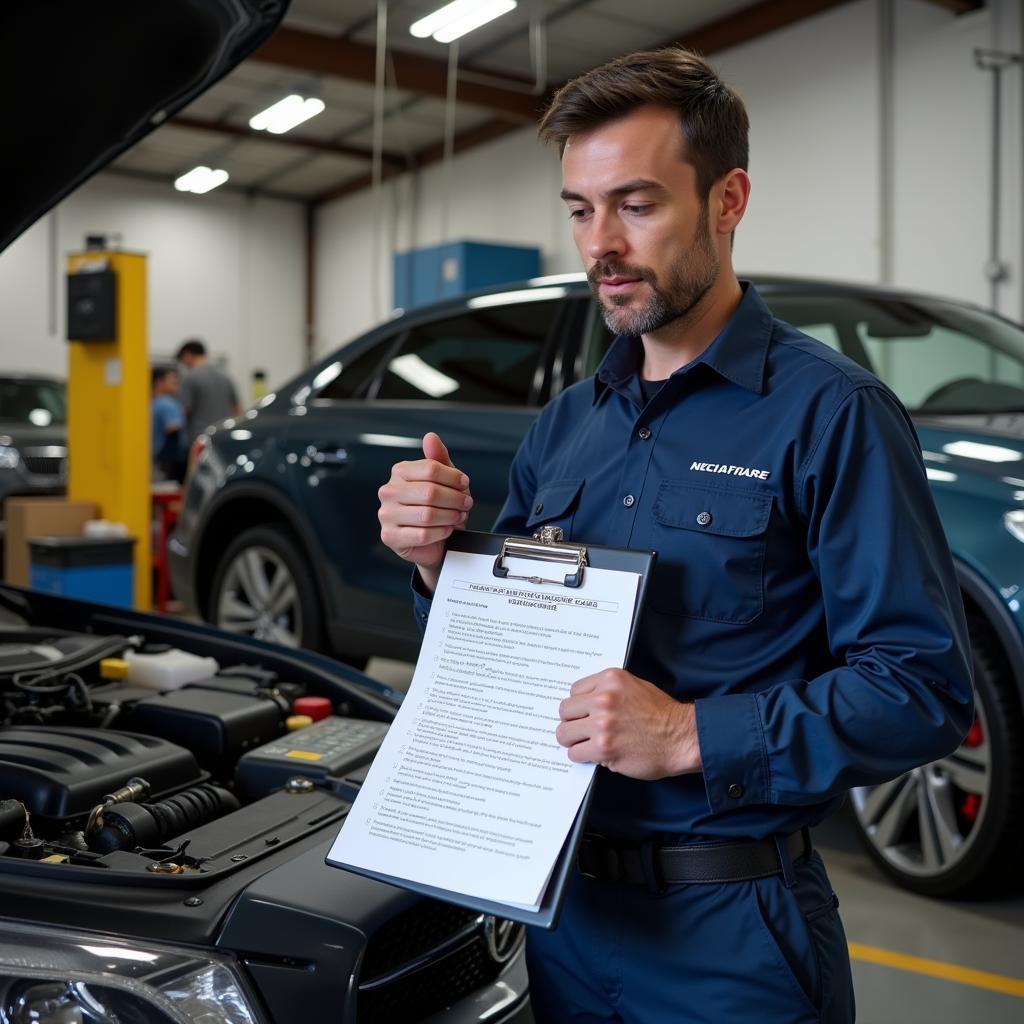Is Customer Service Better Than Customer Care? Unpacking the Nuances
The terms “customer service” and “customer care” are often used interchangeably, leading many to believe they mean the same thing. While both focus on providing positive experiences for customers, there are subtle yet significant differences between the two. Understanding these differences can help businesses, especially those in the automotive industry, tailor their approach to better serve their clientele.
Customer Service: Addressing Immediate Needs
 Customer Service at Car Repair Shop
Customer Service at Car Repair Shop
Customer service is transactional in nature. It’s about addressing the immediate needs and requests of a customer. Think of it as the interaction between a mechanic and a car owner who brings their vehicle in for a routine oil change. The mechanic’s focus is on efficiently completing the service as requested, answering specific questions about the process, and ensuring the customer leaves satisfied with the work done.
Here are some key characteristics of customer service:
- Reactive: Responding to customer inquiries and resolving issues as they arise.
- Problem-focused: Concentrated on finding solutions to specific problems or fulfilling particular requests.
- Time-bound: Interactions are typically short-term, focused on completing a transaction or resolving an immediate issue.
- Metrics-driven: Success is often measured by metrics like resolution time, customer satisfaction scores related to a specific interaction, and service efficiency.
Customer Care: Cultivating Long-Term Relationships
 Building Relationships at Car Dealership
Building Relationships at Car Dealership
Customer care, on the other hand, goes beyond simply addressing immediate needs. It’s about cultivating a relationship with the customer, building trust, and fostering loyalty. Imagine a car dealership that not only sells you a vehicle but also proactively sends you maintenance reminders, provides personalized advice on car care, and offers exclusive deals on future services. This proactive and personalized approach embodies the essence of customer care.
Here’s how customer care differs from customer service:
- Proactive: Anticipating customer needs and exceeding expectations before problems arise.
- Relationship-focused: Prioritizes building long-term relationships with customers based on trust and mutual understanding.
- Holistic: Considers the overall customer journey and aims to provide value at every touchpoint.
- Loyalty-driven: Success is measured by customer retention, lifetime value, and positive word-of-mouth referrals.
Why is Understanding the Difference Important?
For car service businesses, understanding the nuances of customer service and customer care is crucial for several reasons:
- Meeting Evolving Customer Expectations: Today’s car owners expect more than just transactional interactions. They seek personalized experiences, proactive communication, and genuine care from their chosen service providers.
- Building Brand Loyalty: In a competitive market, providing exceptional customer care can be a key differentiator. Customers who feel valued and cared for are more likely to become repeat customers and recommend your services to others.
- Driving Business Growth: Customer loyalty directly translates into increased revenue and sustainable business growth. By investing in customer care strategies, car service businesses can cultivate a loyal customer base that contributes to their long-term success.
Bridging the Gap: How to Provide Both
While customer service and customer care have distinct attributes, they are not mutually exclusive. In fact, the most successful businesses seamlessly blend the two to create a comprehensive and customer-centric approach.
Here are some strategies car service providers can implement to bridge the gap between customer service and customer care:
- Invest in Employee Training: Equip your team with the skills and knowledge to handle both transactional and relationship-building interactions effectively.
- Embrace Technology: Utilize CRM systems, online booking platforms, and other technologies to streamline service delivery, personalize communication, and gather valuable customer data. To learn more about essential car service needs, check out what do u need to service your car.
- Gather Customer Feedback: Regularly solicit feedback from your customers to understand their needs, expectations, and pain points.
- Implement Loyalty Programs: Reward repeat customers with exclusive benefits, discounts, and personalized offers. To get an idea of service costs, you can explore how much is a service for car.
- Empower Employees: Encourage employees to go the extra mile to exceed customer expectations and build strong relationships.
Conclusion: It’s Not a Choice, It’s a Combination
In the realm of car services, the debate between customer service and customer care isn’t about choosing one over the other. It’s about recognizing that both are essential ingredients in creating a customer-centric business that thrives in today’s competitive landscape. By embracing both reactive problem-solving and proactive relationship-building, car service businesses can establish themselves as trusted partners, fostering long-term loyalty and driving sustainable growth. If you’re interested in exploring car buying services, you might find this article helpful: are car buying services good. Remember, satisfied customers are the driving force behind any successful business in the automotive industry.

